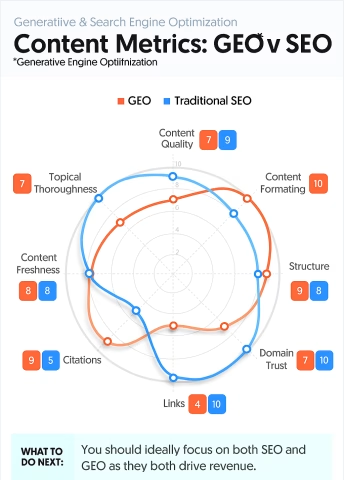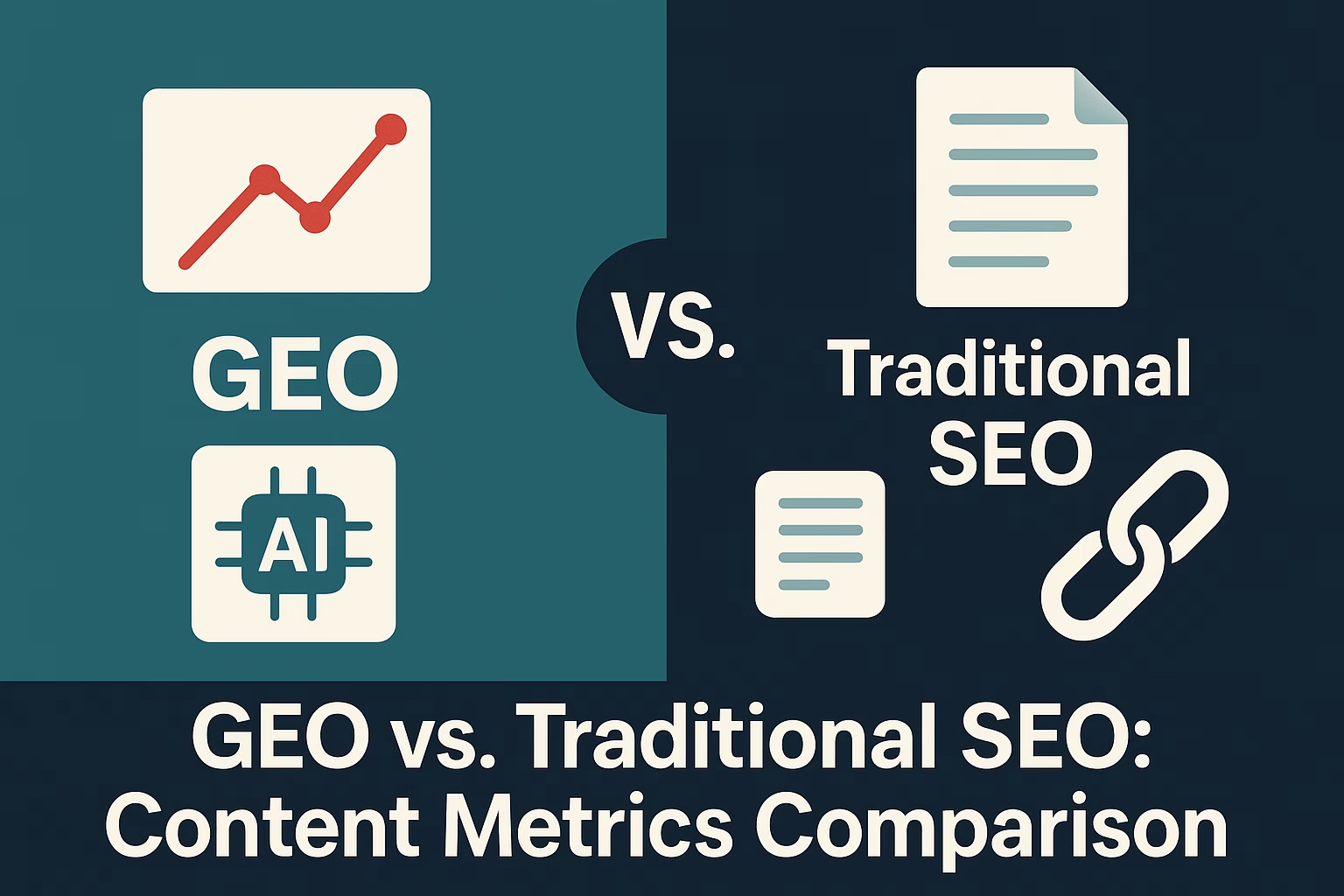The content optimization landscape is evolving rapidly, with traditional Search Engine Optimization (SEO) strategies now facing competition from Generative Engine Optimization (GEO). While both approaches aim to drive visibility, engagement, and results, they differ significantly in methodology and impact across key content metrics. Understanding these differences can help you select the optimal strategy for your digital goals.
What Is GEO?
Generative Engine Optimization (GEO) leverages AI-powered engines to create, structure, and format content aimed at high performance in generative systems (such as AI assistants and modern search engines). GEO emphasizes up-to-date citations, modern structure, and automated formatting, focusing on what generative engines require to surface content in answer boxes or voice responses.
What Is Traditional SEO?
Traditional SEO centers on optimizing website content for organic search rankings, prioritizing authoritative backlinks, comprehensive topical coverage, and established domain trust. This method has long been the backbone of search-driven digital marketing.
Content Metrics: Head-to-Head Comparison
The table below compares GEO and Traditional SEO across core content quality metrics. Each category is rated on a scale of 1 (lowest) to 10 (highest):
| Metric | GEO | Traditional SEO |
|---|---|---|
| Topical Thoroughness | 7 | 10 |
| Content Freshness | 8 | 8 |
| Citations | 9 | 5 |
| Links | 4 | 10 |
| Domain Trust | 7 | 10 |
| Structure | 9 | 8 |
| Content Formatting | 10 | 8 |
| Content Quality | 7 | 9 |

Deeper Dive into the Metrics
Topical Thoroughness
- Traditional SEO excels with complete, well-researched coverage, making it ideal for users and search engines that value in-depth authority.
- GEO tends to offer faster, broader content, but sometimes lacks depth.
Content Freshness
- Both approaches score equally. AI-powered and SEO-driven methods can refresh content and maintain timely updates.
Citations
- GEO is stronger here, as generative content often includes robust, up-to-date citations and references.
- Traditional SEO may not always prioritize citation density unless it’s within a news or academic context.
Links
- Traditional SEO dominates with extensive link-building practices, essential for search ranking and trust.
- GEO typically has less focus on link networks.
Domain Trust
- Traditional SEO sites generally have a legacy of trust, ranking higher in authority due to established reputations.
- GEO properties may be newer, needing time to build equivalent trust.
Structure and Content Formatting
- GEO outperforms in structure and formatting through AI-driven compliance with the latest best practices.
- Traditional SEO structures content well but may require more manual formatting.
Content Quality
- Traditional SEO content undergoes rigorous editorial processes, which often translates to higher quality and accuracy.
- GEO can deliver efficient, relevant content but may lack nuanced polish.
Strengths and Weaknesses
GEO Strengths
- Superior in generating timely citations.
- Follows modern structure and formatting rules.
- Consistency and speed in content generation.
- Optimized for generative AI platforms and answer engines.
GEO Weaknesses
- Struggles with comprehensive, nuanced content.
- Limited abilities in building domain authority via traditional means.
- Less focus on backlink strategies.
Traditional SEO Strengths
- Unmatched in topical depth, link strategies, and domain authority.
- Editorial rigor produces reliable, high-quality content.
- Well-established for organic traffic and long-term trust.
Traditional SEO Weaknesses
- More resource-intensive, requiring continual outreach and manual work.
- May be less agile in rapidly updating content for emerging trends.
- Formatting may lag behind cutting-edge digital presentation standards.
When to Prioritize Each Approach
- Choose GEO if your goals are:
- Fast content delivery for generative engines and instant-answer platforms
- Citing the most recent sources
- Achieving a structured presentation out of the box
- Choose Traditional SEO if your goals are:
- Building deep trust and lasting authority
- Investing in long-term organic growth
- Dominating search rankings for established queries
Actionable Recommendations
- Blend Approaches: Utilize GEO for rapid, citation-rich content and Traditional SEO for detailed guides, foundational resources, and long-term domain authority.
- Monitor Metrics: Regularly assess your content performance on both traditional and generative platforms.
- Invest in Quality and Trust: Ensure content is both factually sound and well-cited, regardless of creation method.
- Update Regularly: Keep cornerstone content fresh and aligned with evolving audience expectations and algorithms.
GEO and Traditional SEO both offer unique advantages. The best digital strategies assess business goals and user needs first, then mix and match these approaches to dominate both new and traditional search environments. Focus on what matters most to your audience: trust, depth, accuracy, and relevance. Both GEO and SEO, used wisely, can drive powerful results.



